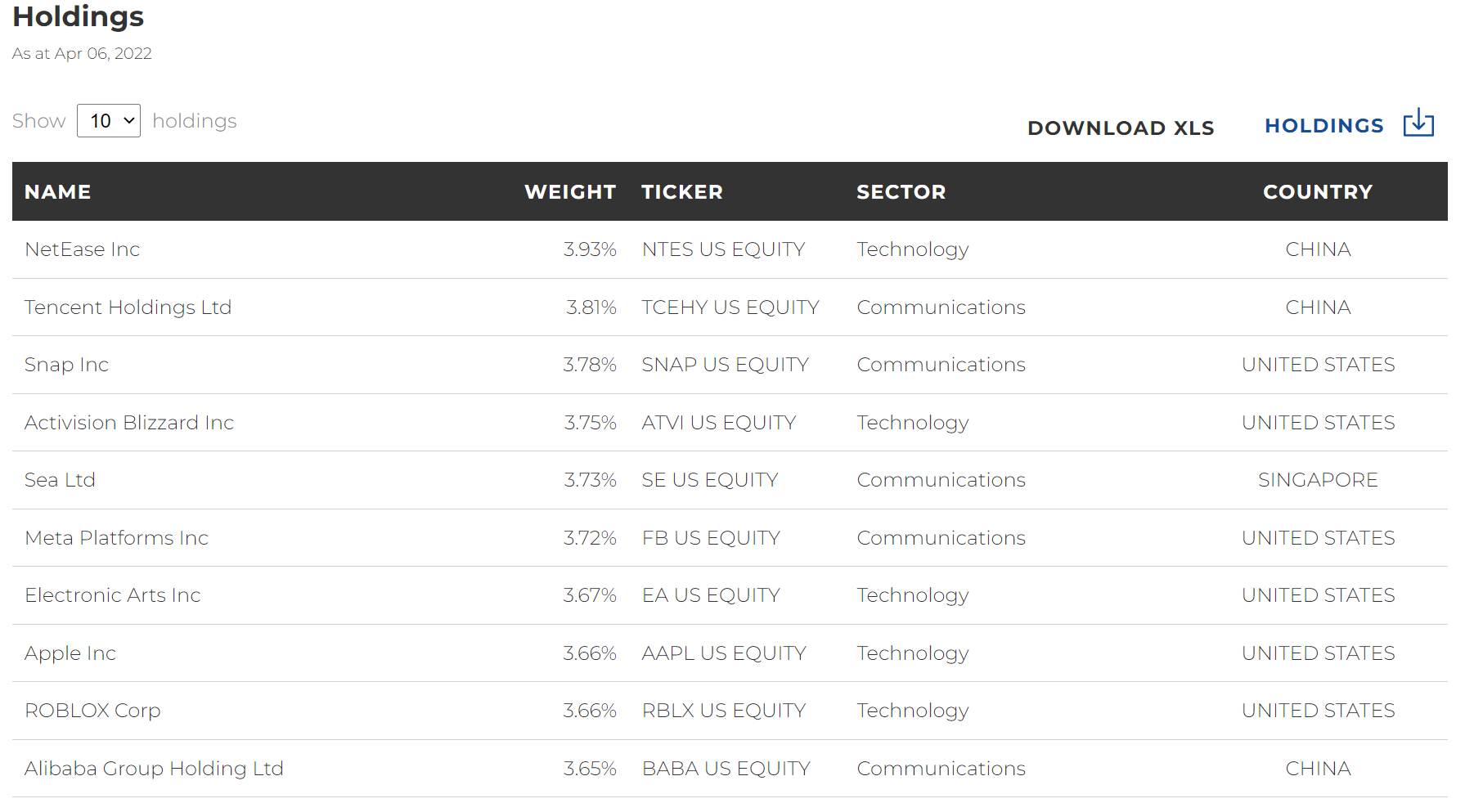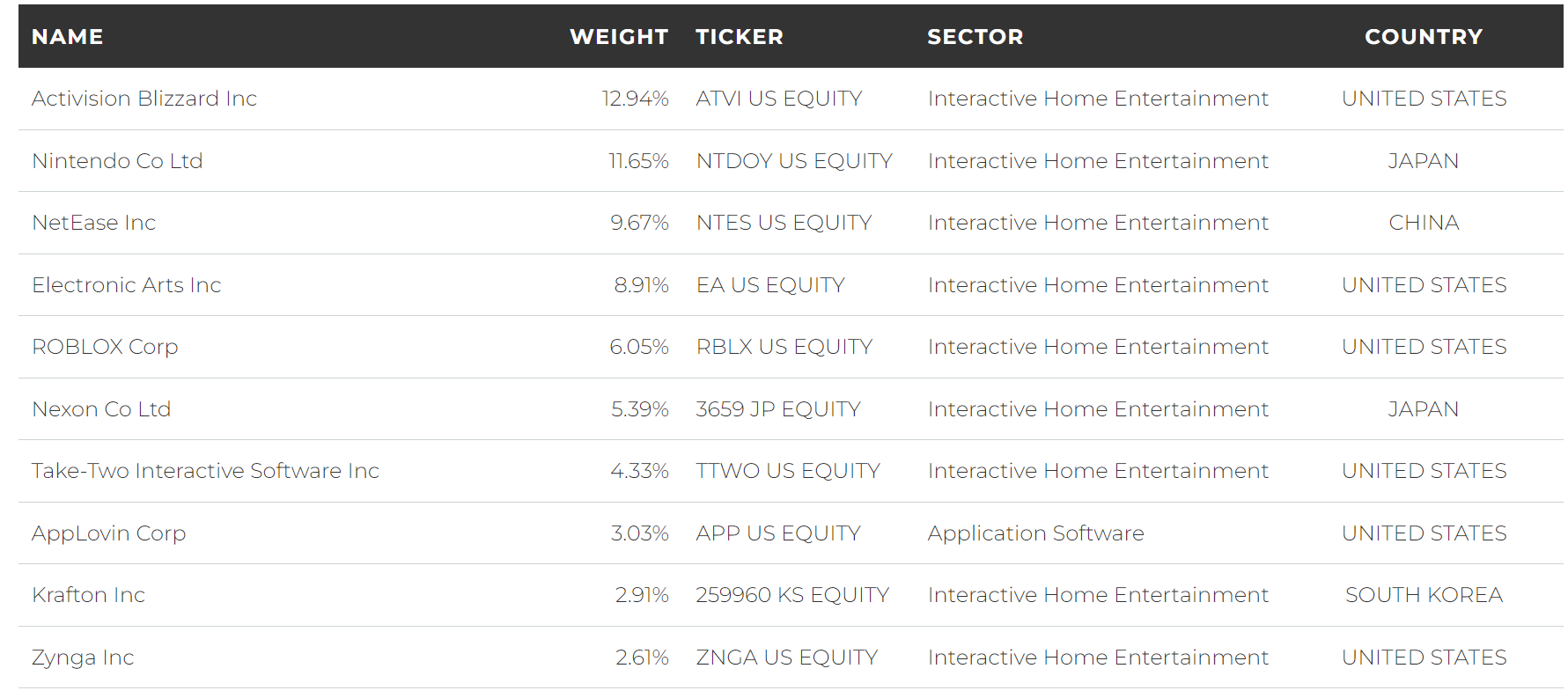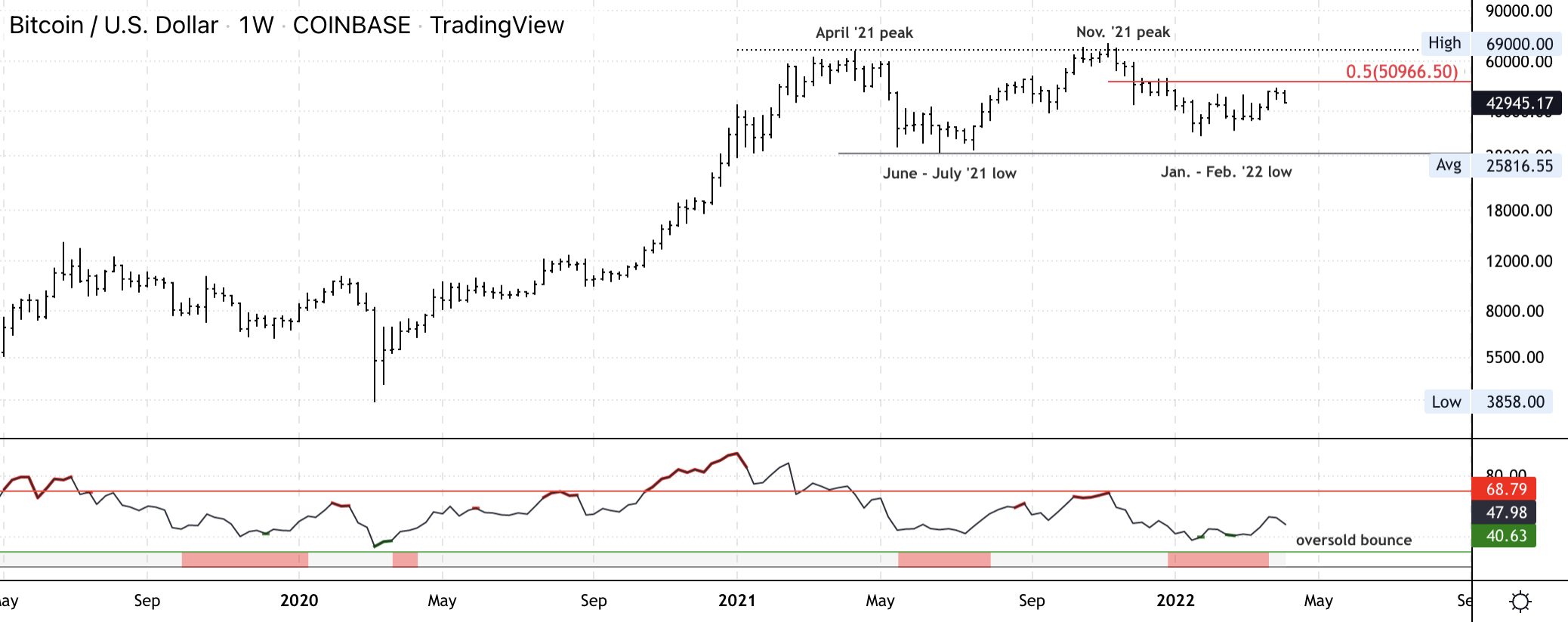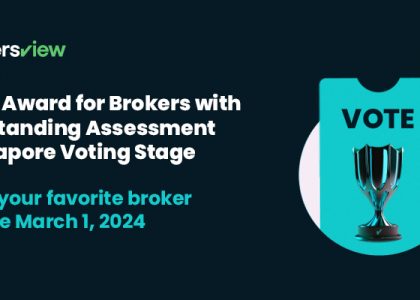The financial services giant has been short on specifics, and the mystery underscores the difficulties in defining what belongs in such products; ether also falls.
Good morning. Here’s what’s happening:
Prices: Bitcoin and ether continue falling; other major cryptos are mixed.
Insights: The holdings of HSBC's Metaverse Fund for Hong Kong and Singapore private banking clients remain unclear, underscoring a fundamental concern about such products.
Technician's take: The current pullback appears to be temporary ahead of seasonal strength.
Prices
Bitcoin (BTC): $42,330 -0.4%
Ether (ETH): $3,226 -0.5%
Top Gainers
| Asset | Ticker | Returns | Sector |
|---|---|---|---|
| Dogecoin | DOGE | +4.7% | Currency |
| Chainlink | LINK | +0.4% | Computing |
Top Losers
| Asset | Ticker | Returns | Sector |
|---|---|---|---|
| Internet Computer | ICP | −4.3% | Computing |
| Algorand | ALGO | −3.3% | Smart Contract Platform |
| Filecoin | FIL | −2.9% | Computing |
Bitcoin, ether lie flat
Bitcoin spent much of its weekend in the doldrums.
The largest cryptocurrency by market capitalization ignored a brief Sunday surge to settle below $42,500 level where it ended Friday amid growing economic uncertainty tied to Russia's unprovoked invasion of Ukraine and looming interest rate hikes by the U.S. central bank. The crypto had started the week trading near $47,000 after a late March jump, fueled by hopefulness about a sooner-than-later end to the Ukraine conflict.
"While some relief came over the weekend, volumes have been low and until a major push drives the price above $48K, BTC is likely to remain under pressure and struggle to old $40K in the coming weeks," said Joe DiPasquale, the CEO of fund manager Bitbull in an email to CoinDesk.
Bitcoin was recently trading at about $42,300 down slightly over the past 24 hours. Ether, the second largest crypto by market cap, followed a similar weekend pattern and was also off a fraction at about $3,200. Other major cryptos were mixed. AXS and Terra's luna token had recently fallen about 1.5% and 2%, respectively. But popular meme token DOGE was up about 5%. Trading was light.
Cryptos' performance lately has largely dovetailed with major equity markets, which have also fallen. The tech-focused Nasdaq closed Friday trading down over a percentage point. The S&P 500 and Dow Jones Industrial Average were also off as investors continued to process an historic swirl of events that could send the global economy into recession.
Over the weekend, Ukraine simultaneously girded for a fresh Russian offensive on cities in the southeastern part of the country while attempting to evacuate civilians, whom Russian forces have been targeting. E.U. countries continued to discuss banning Russian oil and gas, although the continent's largest economy, Germany, has opposed the measure, saying that it would send shockwaves through its economy. The price of Brent crude oil, a widely regarded measure of energy pricing trends, continued hovering well over $100 per barrel, up over 40% from the start of the year.
In its April 8 weekly review of global economic trends, First Republic Bank said that "the macroeconomic backdrop is likely to deteriorate before it improves."
The bank noted that energy price increases stemming from the invasion, had "affected prices in almost all sectors of the economy," and did not expect U.S. President Joe Biden recent decision to release oil from the U.S.'s strategic reserve "to alleviate high energy prices."
"Given rising costs and geopolitical conflict, we believe inflation will rise higher in upcoming months," the bank wrote.
BitBull's DiPasquale said that wider concerns could weigh down cryptos well below the $40,000 threshold. "We should see a reaction around $37K and $32K, but BTC is in need of a catalyst to sustain any bullish momentum ahead of macro concerns, such as more interest rate hikes and monetary policy changes."
Markets
S&P 500: 4,488 -0.2%
DJIA: 34,721 -0.4%
Nasdaq: 13,711 -1.3%
Gold: $1,946 0.6%
Insights
The holdings of HSBC's Metaverse Fund remain a mystery
Last week HSBC (HSBC) announced a Metaverse Fund for its private banking clients in Hong Kong and Singapore. To the outsider, this has all the makings of a FOMO narrative: accredited investors only, investors in Hong Kong and Singapore only – where more exciting investment opportunities are available – and finally the metaverse, which Citi claims will be a $13 trillion opportunity by 2030.
But what exactly is this fund? What does it hold? Does anyone know? The official response from HSBC is boilerplate and the company declined to go into specifics. “The portfolio is actively managed and focuses on investing in companies within the metaverse ecosystem, with five key segments, namely Infrastructure, Computing, Virtualization, Experience and Discovery, and Human Interface.”
The fund, which is said to be based in London, targets investors in Hong Kong and Singapore, but there doesn’t seem to be a registration with regulators yet (CoinDesk checked FCA, MAS, and SFC directories), which suggests the fund is still in development and hasn’t been officially listed. So we’re left guessing what’s inside it.
Prior metaverse funds have been a mixture of gaming and tech companies.

Evolve Metaverse ETF
This isn’t necessarily a bad thing. Rather, it's simply a product of what the metaverse is: gaming and tech. At its core, the metaverse is a gaming experience, so the question remains why you would need a specific fund for this.
After all, the same companies that power gaming experiences, like Unity and Unreal, which make game engines, or EA and Activision, which make the games themselves, would have a similar place and weight in a pure gaming fund.
In fact, if you compare a gaming fund to a metaverse fund they are nearly the same.

Every few years investors and the tech industry must invent new terms, and metaverse seems to be one of them. It’s simply gaming, rebranded. The dream of an interoperable gaming world bound together by non-fungible tokens (NFT) and blockchain, such as in Ready Player One, isn’t going to happen as intellectual property (IP) rights holders like Nintendo would get nervous about what might happen if their characters crossed over to different gaming worlds and beyond their control .(It could be vulgar.)
If you want to find a real metaverse, it would be an online gaming service like Xbox Live or Steam, which have been around for 20 years. Your digital identity is portable between games; online peers can see your name and scorecard. But that’s it. Each game is a separate world – nothing is transposable.
Gaming is a huge market, accelerated by stay-at-home orders during the coronavirus pandemic. This is the real $13 trillion opportunity.
The “metaverse” as it exists for the crypto industry? Not so much.
Remember, major crypto metaverse platforms like The Sandbox or Decentraland have an active user base counted in the hundreds or low thousands. The tokens affiliated with the platforms have had major year-to-date losses. Would you even want to hold them?
Given that HSBC’s fund is only open to accredited investors, one might expect its contents to be more exciting. The fund is unlikely to hold tokens directly, and if it did, such a holding would be earth-shattering. HSBC brass has previously declined to allow its wealthiest clients to get exposure to digital assets, unlike other banks.
There are a few privately held gaming companies out there, including Valve, which is behind the Steam platform, but this is a well-established firm, not a startup; it’s unlikely that HSBC would need to close off the fund to anyone but accredited investors.
So what is inside this fund? Is it just a collection of publicly listed gaming and technology companies wrapped behind the term "metaverse" and the allure of being restricted to accredited investors only?
Technician's take

Bitcoin weekly price chart shows support/resistance, with RSI on bottom. (Damanick Dantes/CoinDesk, TradingView)
Bitcoin (BTC) is stuck in a tight range, albeit with occasional price swings. The cryptocurrency is approaching a support zone between $40,000 and $43,000, which could stabilize the pullback.
Resistance at $48,000 and $50,000 have capped price rallies over the past four months, which means sellers are in control. Meanwhile, there has been a significant loss of downside momentum, suggesting that buyers could remain active at lower support levels.
On the weekly chart, the relative strength index (RSI) dipped below the 50 neutral level. That reflects a slight loss of upside momentum since BTC's breakout above $40,000 on March 28.
Still, the current pullback appears to be temporary, similar to what occurred in September of last year. This time, however, speculative assets such as stocks and cryptos are entering a seasonally strong period in April and May, which could attract short-term buyers.
Important events
- 9 a.m. HKT/SGT(1 a.m. UTC): Bank of Japan Governor Haruhiko Kuroda speech
- 9:30 a.m. HKT/SGT(1:30 a.m. UTC): China consumer price index (MoM/YoY March)
- 9:30 a.m. HKT/SGT(1:30 a.m. UTC): China producer price index (March)


